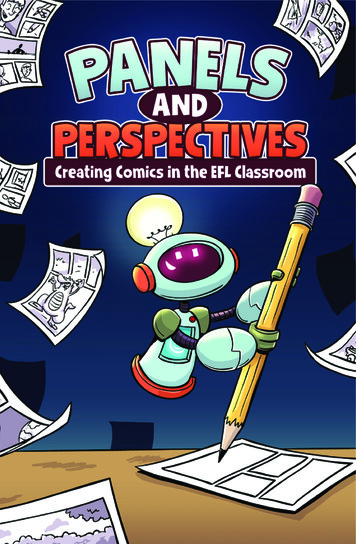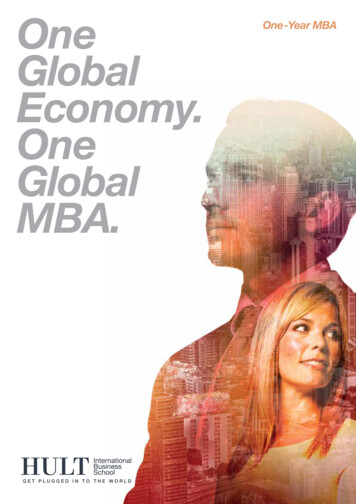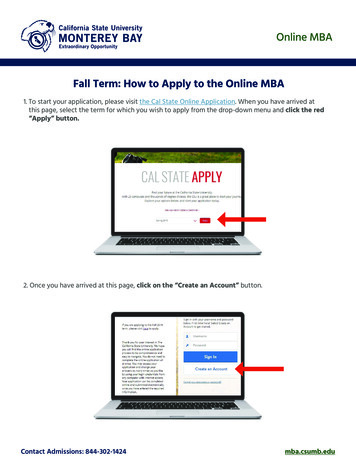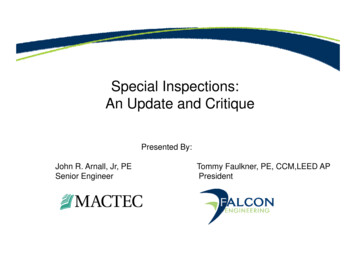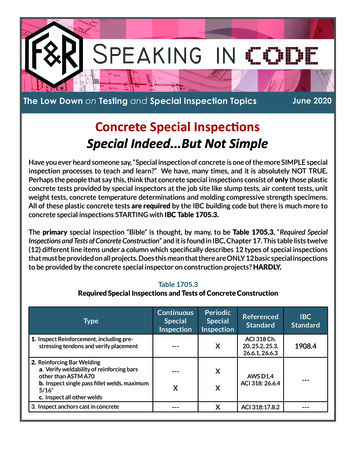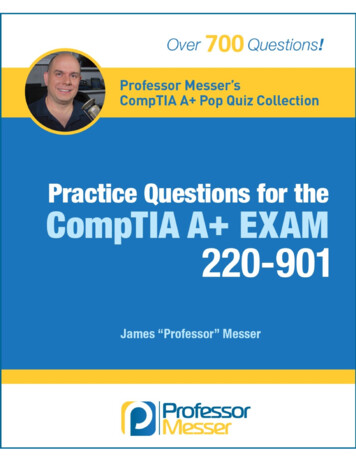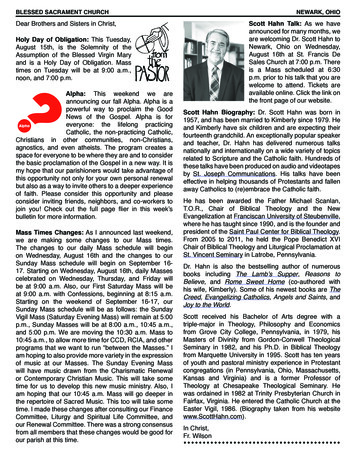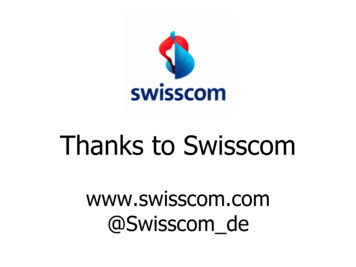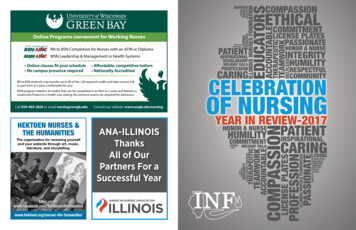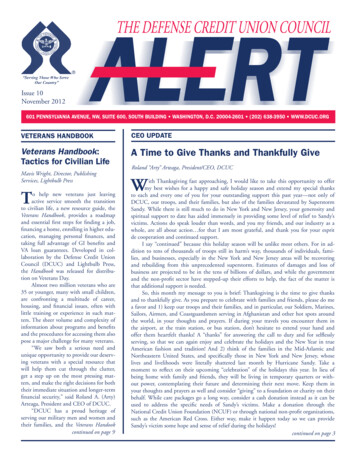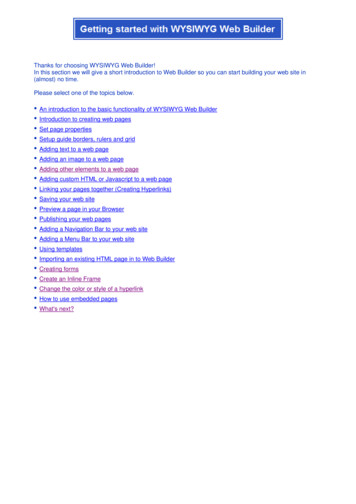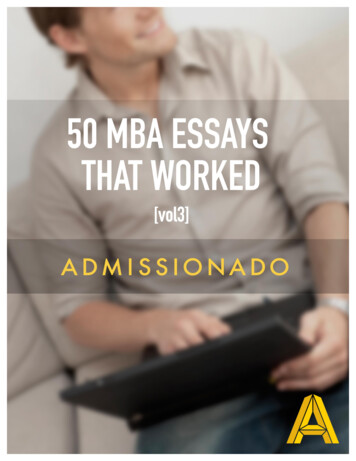
Transcription
1
2A SPECIAL THANKS A lot of hard work and late nights went into makingthis book happen. And for that, we want to thank ourmain contributors: Head Consultant Yaron Dahan,Managing Editor Ann Ford, Senior Editor SachOrenstein and, of course, the hard-working (and badass) applicants who dedicated themselves todeveloping kick-ass essays.
3TABLE OF CONTENTSWelcomePart 1: GoalsFeaturing Essays From: CBS, Tuck, UCLAAnderson, Haas, USC Marshall, WhartonPart 2: LeadershipFeaturing Essays From: MIT, Yale SOM,Kellogg, TuckPart 3: Program-SpecificFeaturing Essays From: Duke, McCombs,CBS, TepperPart 4: PersonalFeaturing Essays From: HBS, Fuqua,Georgetown, Tepper, Ross, Haas, UNCKenan-Flagler, Stanford GSBPart 5: OtherFeaturing Essays From: MIT, Oxford, IESE,Kellogg, INSEAD, WhartonAfterword
4WELCOME to the third volume of Admissionado’s 50 MBA Essays That Worked.The aim of this 50 Essays collection is two-fold: First and foremost, we want to showyou snapshots of a successful applicant; how their stories fly off the page, and howthey present airtight arguments for why THEY deserve that coveted spot at their targetMBA program. Second, but equally important, we want to show that these winningessays rarely (never!) start out perfectly. It takes work. And patience.A quick overview of who we are and what we do: Our clients are overachievers, just likeus. They are aiming for Top 15 MBA programs and, therefore, they are competing withthe best the world has to offer. Each client teams up with an expert MBA consultant onour team (also a graduate of a Top 15 MBA program but, more importantly, an expert onthe admissions process) as well as an essay specialist. This “power couple” guides theprocess from start to finish, balancing strategic insights and applicant profilepositioning with the challenges of bringing out those insights through clear, wellpaced, well-organized prose. Draft after draft, we pound and slash and kick and shredand shape and reshape. The result? Essays that our clients have authored entirely ontheir own, with smart guidance from us, which lead to admits.Enclosed are 50 sample essays from applicants now earning their MBA at places likeWharton, Stanford, HBS, etc. While the finished essay speaks for itself, we have alsoprovided quick insights on each essay’s effectiveness. Each sample is followed by ahigh-level diagnosis from our MBA strategy experts on WHY the essay turned heads.You’ll also see a structural breakdown from our essay specialists of how eachcomponent of the essay strengthens the overall argument, while highlighting specificexamples straight from the page.But wait, there’s more!We selected nine of those essays to reveal a little more of the process that led to thosefinal results. We show you the very first draft and a sample of our feedback. Then weshow you the final draft, including commentary from our MBA experts and essayspecialists. Through these nine samples, you’ll see how each essay starts out as a pieceof uncut marble, but ends up transformed into a lifelike sculpture. (Bear in mind, inorder to make these easy to read, we’ve cut out some of the detailed feedback.) If you’recurious to see what that might look like, we have included an “unabridged” first edit atthe end, so you can get a glimpse into our process.
5MBA essay prompts are challenging, folks. Boy do we remember. We have beenthrough exactly what you’re going through. But we lived to tell the tale, and so will you.We applaud your ambition and hope this volume gives you a teaspoon of inspiration toaccompany you on your exciting journey.Note: To protect the privacy of our clients, we’ve made small changes to the identifyingdetails in each essay — names of places, companies, specific products, etc. For instance,we might have changed an essay about Kazakh pear farming to one about Mongolianapple farming. However, we’ve preserved the style, meaning, and impact of each storyon the whole.And of course, a disclaimer: While essays play a big part in the application process,they’re not the only factor admissions committees consider. Each of the essays in thiscollection was evaluated in the context of the applicant’s other essays, test scores,academic and work history, demographic factors, and school-specific considerations.Results (good or bad) are never guaranteed!
6PART 1: GOALS
7Part 1: GoalsThe big picture, the crystal ballJust about every b-school is gonna ask: “If we give you an MBA, what are you gonna dowith it?” And what they’re really saying is “Assure us that you are going to besuccessful, which will help to advance our interests one way or another.”Unfortunately, pulling this off isn’t always easy. As much as applicants want to saythat their decision to get an MBA at Stanford is all part of an ironclad 20-year plan fullof salary graphs, promotion charts, and the home phone numbers of all their intendedfuture bosses yeah. Most of the time, it’s not.There’s no shame in not having it all figured out. But ultimately, the admissionscommittee (which we will refer to as the “adcom”) is gonna remember the candidatewho wants to do “corporate finance management for a media conglomerate like TimeWarner” much more than they’re gonna remember the candidate who wants to do“something rewarding.”The other key to unlock this prompt is to remember that your goals are only asinteresting as your ability to pull them off. An idea from a 7-year-old about a magicalapp that solves some incredible pain point of life is just the result of an activeimagination. That same app idea from a proven entrepreneur with a track recordbegins a bidding war. The only difference is. Who’s the one doing the pitch? You’vegotta back up your goals with evidence that you’re a guy who can actually makesomething happen. THAT’s the goal that perks ears.The applicants included here know that the goals essay is just the first draft of a LifePlan. It’s not a contract. No Goals Essay Review Board is going to revoke an MBA if thegraduate isn’t in the job they said they’d be in after graduation (very few are, by theway, and business schools understand this; expect it, even). But nor is it an explorationsession, where candidates wander aimlessly through a field of possibilities for 500words. Pick one potential plan, that somehow ties in to your own strengths and proventrack record (even for a career changer), and develop that story.What do all the essays below have in common? They lay out ambitious end goals, showus their VISIONS for the future. and take us through how they’ll get there.Let’s take a look.
81KEEP THIS IN MIND: This candidate just tells a great story about how he came from amodest background in a less developed country, moved forward in life, and wants to dohis part through business. What makes this story work is his introspection.Given your individual background and goals, why are you pursuing a Columbia MBAat this time? (500 words)Growing up in the Dominican Republic, I saw how inadequate infrastructure haltedprogress and how development, including paved roads, created jobs in fields fromheavy industry, to manufacturing, to “mom and pop” shops - boosting the country’seconomy. I especially appreciated how upgraded ports grew trade, increasinggovernment revenue and subsequently, my public servant parents’ paychecks. Nowmy personal and professional objective is to create similar growth by launchinginfrastructure investment projects. I will accomplish this by managing a large scaleinfrastructure project, leveraging three to five years investing in infrastructure assetsand achieving operational improvements as an investment associate, post-MBA.A Columbia MBA is the first step towards my goal, as it will provide the skills I need tobe a successful infrastructure investment manager. I need value investment skills toimprove both my operational performance and capital management knowledge ofinfrastructure projects so I can maximize my projects’ returns. In the past, publicfinancing alone met infrastructure needs, but today recent estimates suggest there isan annual half-trillion dollar funding gap in global infrastructure investment. Given theneed for private funding, I will become an investment associate at an infrastructurefund like Sentry in the near-term, leveraging my Columbia MBA and credit skillsdeveloped at Booz & Co. to source and analyze infrastructure projects as an associate,before ultimately directing my own projects as a senior manager.As a manager, I will encourage infrastructure investment through improved decisionmaking on large-scale projects like the JFK Airport upgrade. This project is sufferingfrom ”decision paralysis” regarding renovations and is an example of how bettermanagement can mean substantive improvements. I will become a difference makeron such projects by developing strategic intuition through Professor Duggan’s“Napoleon’s Glance” class, learning to combine knowledge and experience to gainhidden insights. I will also study Decision, Risk, and Operations with ProfessorWeintraub to avoid the process analysis, waste and quality control issues plaguingoperations like the Second Avenue Subway. Additionally, I will personalize myColumbia experience by exploring non-conventional classes like “Impact Investing,”which will help me attract infrastructure investment to developing countries andhighlight the benefits of social responsibility. Furthermore, Columbia’s embrace ofLearning Teams and peer feedback mirrors investment committee interactions,
9preparing me to build the consensus needed to finance projects. Finally, the GlobalImmersion group classes will prepare me to handle infrastructure challenges acrosscultures.Columbia’s leadership practice will also contribute to my personal growth. I hope to usethe insights gained from participating in speaker forums at the Chazen Institute toconvince skeptical stakeholders to invest in projects like roads, when weighing thetrade-off between infrastructure and other near-term needs. Influencing change wouldmean fulfillment of a personal ambition. I will also learn to understand cross-culturalissues including subtle policy differences between developing and developed nations,transforming my own worldview ahead of working in the developing world. MyColumbia experience will provide a deeper understanding of myself, my organizationand my community, and my ability to contribute to each.Structural Breakdown: Intro — This applicant connects his long-term goal to his time growing up,highlighting how infrastructure investment changed his life as a child beforeintroducing what he’ll do in the field, post-MBA. This establishes a strongpersonal reason for his ambitions – he’s not just another guy who wants a job,and we want to hear more about his plans. Background — The applicant breaks down some of his essential skill gaps andhow a CBS MBA will solve them, but the heart of this paragraph lies in hisdescription of current infrastructure issues and how he hopes to solve themAND gain experience through his post-MBA role. In this paragraph, everythingconnects from the school to his industry of choice to his short-term goals. Thatsaid: how will CBS REALLY help him? Why CBS? — The next paragraph is dedicated to specific classes and professors,highlighting how he’ll leverage each to gain specific skills for specific tasks.Importantly, the applicant isn’t just name-dropping here; he’s linking CBS to hisfuture role, tying everything together. Now we just need to see a personalconnection to the school. Conclusion — Finally, he connects CBS, the Chazen Institute, and his personalgrowth, bringing everything back to the essay’s initial theme.Here's why we want this applicant at our business school based on this essay:This dude has done his homework. He is a sort of “regular Joe” when it comes to hisgoals, but he makes himself unique by both showing what these goals MEAN and byshowing EXACTLY how Columbia will help him reach them.
10And here are some SPECIFIC examples in the essay of how he does this: “Growing up in the Dominican Republic, I saw how inadequate infrastructurehalted progress and how development, including paved roads, created jobs infields from heavy industry, to manufacturing, to ‘mom and pop’ shops - boostingthe country’s economy.” – In this opener the candidate grants us insight into thereasons behind his application, and even if they are “normal” reasons, it justhelps us identify with him a whole lot better. “I will become a difference maker on such projects by developing strategicintuition through Professor Duggan’s “Napoleon’s Glance” class, learning tocombine knowledge and experience to gain hidden insights.” – He doesn’t justgive us a list of what there is at Columbia, he applies the example to somethingthat HE specifically will need in order to succeed. He is making his MBArelevant. “I will also learn to understand cross-cultural issues including subtle policydifferences between developing and developed nations, transforming my ownworldview ahead of working in the developing world.” – And he closes, remindingus that it’s not JUST about the business, but also what he can lead the businessto DO. And that makes all the difference.2SHOWCASE: FIRST TO FINALCrafting Goals for TuckFirst VersionWhy is an MBA a critical next step toward your short- and long-term career goals?Why is Tuck the best MBA fit for you and your goals and why are you the best fit forTuck? (Maximum 500 words)My interest in a Tuck MBA stems from my goal of entering the renewable energyindustry, first with an MBB strategy consulting firm, and later in a senior corporatestrategy role with a renewable energy firm. I feel that I’ve honed my research and softskills during my time at Brahm and PwC, but have not yet had the opportunity toapproach business from an academic perspective. Although my professional andacademic background has initially enhanced my positioning for a transition intorenewable energy, I recognize the need for the theoretical, practical, and leadershipeducation provided by an elite MBA program. With my business acumen and personal
11brand enhanced through two years of learning and networking at Tuck, I’m certain Ican successfully make the next step down my desired career path.In college, I pursued courses of personal academic interest but, in doing so, overlookedlearning core business skills. My undergraduate experience was not without merit,however, as I was introduced to classes on energy policy and sustainable developmentthat fuel my current career interest. During my senior year, in particular, I developed akeen interest in the geopolitical effects of energy generation and its requisiteresources. My professional experience researching utility industry issues for PwC’spower and utilities clients, as well as performing due diligence on similar firms while atBrahm, has only furthered my belief in the need for a robust renewable energy sector.These experiences have coalesced to instill in me a desire to work with and leadcompanies that seek to further the market viability of renewable energy technologies.I strongly believe my short term career goals can only be accomplished through theeducational and networking opportunities provided by an MBA program of Tuck’sstature. When speaking with recent alumni, Tuck’s emphasis on collaborative work,leadership development, experiential learning immediately becomes apparent. Thecongenial group environment emphasized at Tuck is the ideal format to debate themyriad ways business problems can be solved by leveraging others’ experiences, andis one in which I expect to excel. I believe strongly that success in any endeavor rarelyoccurs in a vacuum. My own personal and professional successes, whether assisting aclient meet a tight regulatory deadline, climbing Mt. Katahdin, or organizing a microMBA program for small business owners in a Nigerian village, have all resulted withinput from others. I look forward to continuing this trend within the cohesivecommunity fostered by Tuck.The opportunities to use my Tuck education to address real world problems outside ofthe classroom while still in school is another reason I wish to attend Tuck. Having beenexposed to three different industries during my short career, I’ve discovered thatlearning is best done by doing. Being provided hands-on learning through opportunitieslike the First Year Project and Tuck Global Consultancy, as well as organizations likethe Tuck Student Consulting Services and Dartmouth Energy Collaborative, willprovide me critical hands-on experience to hone my consulting skillset and energyindustry knowledge. Between these two pillars of the Tuck experience, I will be ideallyplaced to tackle the strategic energy issues of tomorrow.Notes from our Essay Specialist: First major issue here: Where are the goals? There’s no way this guy can explainwhy Tuck is critical SPECIFICALLY for his goals if we have no idea what hisgoals really are. And “the next step down my desired career path” doesn’t reallymake the cut. So let’s have him SHOW us what his goals are (specifically, whatjob in what industry with examples of potential employers) as well as WHY
12these are his goals. Let’s have him peel his ideas like an onion, and reveal theirtrue core. Second is: Why Tuck? Tuck, being the small intimate school it is, really wants tounderstand why people REALLY want to go there and not somewhere else. Sure,here the applicant gives us some reasons in the form of Tuck programs, but itdoesn’t yet feel personal. Any similar MBA program might have a number ofsimilar courses, and remove the word Tuck and replace it with School X, and it’llstill be true. So what we need to do here is weave his logic for choosing Tuckinto his goals, all while showing the adcom his real excitement for attending theschool.Sample outline to guide the next draft: Spark — Before we get to your goals, let’s show WHY you care so much aboutrenewable energy. Why does THIS drive you instead of say, fighting poverty orworking in banking? Let’s show the EMOTIONAL CORE of why you want to dothis. The adcom is in the business of finding interesting people, so let’s spice itup a little by opening with your biggest dreams: Senior corporate strategy at arenewable energy firm. Snapshot — Then, you can describe your long-term goal, and then your shortterm goal. Show how your short-term goal will help you reach your long-termambition; how do they connect? Then close the paragraph by saying that youneed Tuck to achieve these things. Background — What cool stuff have you done? Let’s highlight your skills andachievements and then show the skills you DON’T have. How will Tuck help youget them? We need to convince the adcom that you will change the world ifonly you had a Tuck MBA. We shouldn’t be vague here either: You don’t need“general business skills,” you need knowledge of “Central Asian energy markets”and “energy derivatives regulation” (for example). Tuck — Here we show how Tuck and only Tuck can fill the gaps you havedescribed: things that only Tuck has. Classes, programs, people how do theylink up with your career? Let’s avoid anything general that could fit on abrochure or appeal to most students. We want to see the stuff that really worksfor YOU. Conclusion — Just a brief (three sentences at most) summary of the essay,closing on the long-term goals you opened with.
13Final VersionKEEP THIS IN MIND: There are two fantastic things in this ambitious essay. Firstly, thecandidate exposes his dream of an alternative future of life without greenhouseemissions all while “keeping it real” by targeting the specific consulting job that willallow him to do that. Secondly, he shows great fit with Tuck, not just in how the classesmatch his needs, but how the whole philosophy of Tuck fits with his personality.Why is an MBA a critical next step toward your short- and long-term career goals?Why is Tuck the best MBA fit for you and your goals and why are
Georgetown, Tepper, Ross, Haas, UNC Kenan-Flagler, Stanford GSB Part 5: Other Featuring Essays From: MIT, Oxford, IESE, Kellogg, INSEAD, Wharton Afterword . 4 . A Columbia MBA is the first step towards my goal, as it will provide the skills I need to be a successful infrastruct

